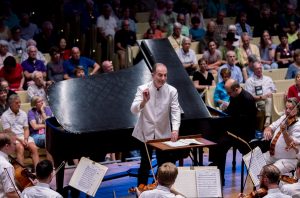
The Chautauqua Symphony Orchestra opened last week with 19th-century Russian composer Sergei Rachmaninoff’s last composition for piano. Tonight, the CSO and internationally acclaimed guest pianist Alexander Gavrylyuk will explore two pieces, including one showing Rachmaninoff’s fresher, more youthful side.
The CSO and Gavrylyuk will perform Rachmaninoff’s Piano Concerto No. 1 at 8:15 p.m. Tuesday, July 2 in the Amphitheater. It is Rachmaninoff’s first major composition — written at 19 years old.
Alongside Rachmaninoff’s piece, the concert will include selections from 19th-century German composer Richard Wagner’s opera, Tristan and Isolde — an influential drama that explores love potions, betrayal and more. The orchestra will play the opera’s prelude and its climactic song, “Leibestod” or “love-death.”
Rossen Milanov, conductor and music director of the CSO, said Wagner was one of the most influential composers in his era.
“Richard Wagner is one of those iconic composers … who literally changed the course of music,” Milanov said. “He had a way of making a significant theme much bigger than itself and infusing it with incredible sophistication, harmony and structure. He could add all these layers of meaning to explain not only the music itself, but also ideas related to the opera. He created something that had probably never been seen before.”
Milanov said Wagner’s ability to deal with heavy themes inspired other composers.
“He led the way to … creating something bigger than just a combination of sounds, something with a deep philosophical meaning,” Milanov said.
Gavrylyuk, who serves as Chautauqua Institution’s Heintzelman Family Artistic Adviser for the School of Music Piano Program, said the two Rachmaninoff’s pieces share a connection; Rachmaninoff wrote one at the beginning of his career, and another toward the end.
“There’s a number of years between the two pieces — Rachmaninoff’s whole lifetime,” Gavrylyuk said. “The first piano concerto is his first opus. It was the first piece that he considered worthy of officially recognizing as his Opus One.”
Gavrylyuk said the composer’s youth shows in the piece’s fresh energy.
“The concerto is very fresh, very youthful, passionate — not burdened by heavier aspects of life,” Gavrylyuk said. “It’s a very optimistic work.”
Audience members who attended last week’s Rachmaninoff concert will see a distinct difference between the two pieces, Gavrylyuk said.
“The concert with Rachmaninoff’s first concerto for piano will be very different from (last Wednesday’s) concert — completely different energy, a different kind of message … completely different colors with which he expressed himself.”
Gavrylyuk said last Wednesday’s piece, Rachmaninoff’s “Rhapsody on a Theme of Paganini,” resounds with its composer’s life experiences and influences.
“Of course, this is when Rachmaninoff had his whole lifetime behind him,” Gavrylyuk said. “It’s a piece written with a lot of life wisdom and experience. It definitely has an American flavor as well, because by that time he had lived in the United States for quite a while.”
Tonight’s piece, resounding only with the precocious 19-year-old’s life experience, will be different.
Gavrylyuk said Rachmaninoff’s first concerto is fresh and new, but it already shows some of the composer’s favorite themes.
“The first piano concerto, on the other hand, was written when he was 19 years old,” Gavrylyuk said. “He was still a student, and it was really his first serious attempt at composition. It was very fresh, very raw and very new, but we can already sort of hear the themes of Rachmaninoff pieces — his melodies and his interactions with darker themes. There are very positive, very victorious resolutions to those dark moments.”




